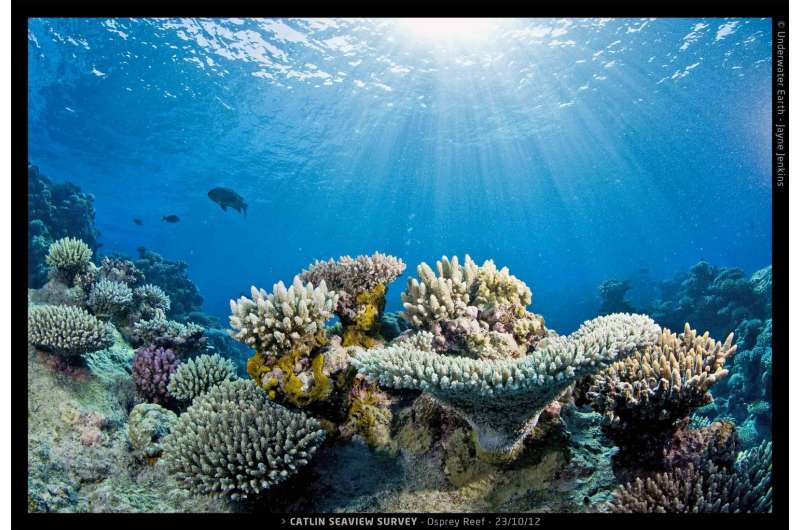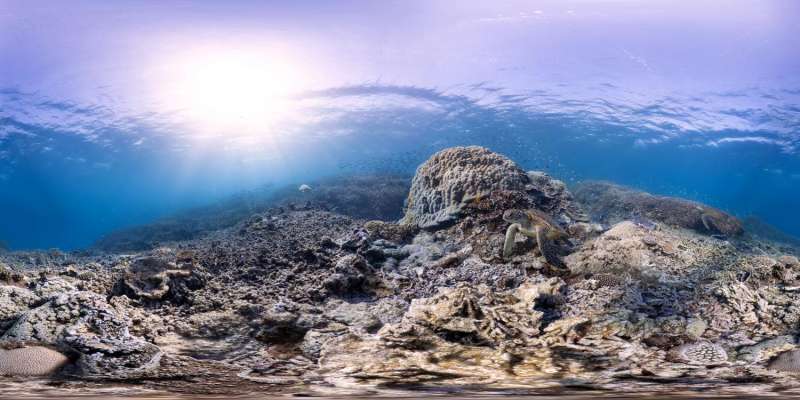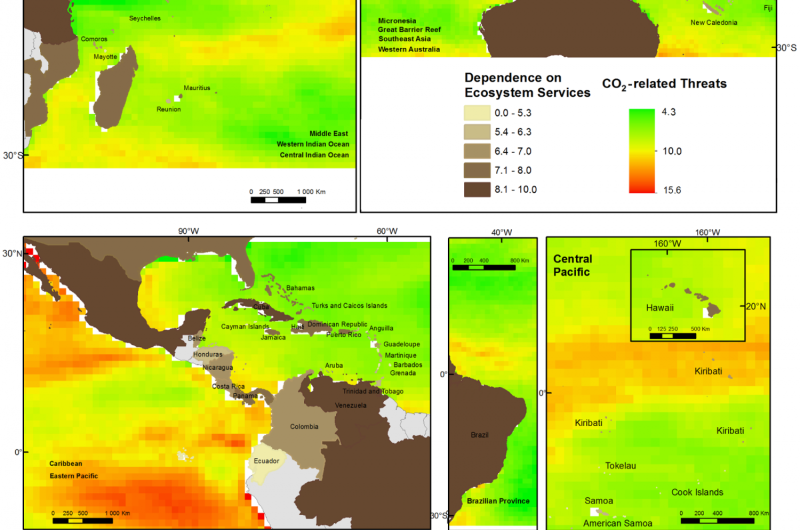Rising CO2 threatens coral and people who use reefs

As atmospheric carbon dioxide (CO2) levels rise, very few coral reef ecosystems will be spared the impacts of ocean acidification or sea surface temperature rise, according to a new analysis. The damage will cause the most immediate and serious threats where human dependence on reefs is highest.
A new analysis in the journal PLOS ONE, led by Duke University and the Université de Bretagne Occidentale, suggests that by 2050, Western Mexico, Micronesia, Indonesia, parts of Australia and Southeast Asia will bear the brunt of rising temperatures. Reef damage will result in lost fish habitats and shoreline protection, jeopardizing the lives and economic prosperity of people who depend on reefs for tourism and food.
"Some scientists have held out hope that there would be reef areas that could escape the harm of climate change, but we find that most reefs will be affected by either warmer seas or more acidic oceans," said Linwood Pendleton, the study's lead author, a senior scholar at Duke University's Nicholas Institute for Environmental Policy Solutions and an International Chair of Excellence at the European Institute of Marine Studies. "2016 has been one of the worst years in memory for coral bleaching. This fact is demonstrated by this year's bleaching event that affected nearly all of the Great Barrier Reef."
The study builds on previous analyses to identify exactly how people and coral reefs are affected by a high-CO2 future and suggests pathways to help deal with changes. The authors mapped human dependence at the country level, scoring for two indicators: shoreline protection and coral reef fisheries. Simultaneously, the authors mapped the largely unavoidable impacts of increased sea surface temperature and ocean acidification.

Using data from the maps, the study predicts that the countries of Oceania will be among the first to face the greatest environmental stresses from climate change and ocean acidification, followed by the Coral Triangle countries of Southeast Asia and other parts of Australia—all areas with high dependence on coral reefs.
Countries most likely to experience severe ocean acidification are generally different from those that will experience the earliest onset of coral bleaching. Acidification is projected to be worse for Baja California (Mexico), Japan, China, and southern Australia because they are at the upper and lower latitudinal bounds of coral reef distribution and thus generally in cooler waters that naturally carry more CO2.
"The response of non-governmental organizations, nonprofits, and labor and trade organizations will be critical in mounting a response to the threats posed by warming and acidification because these organizations represent the people that will be most severely impacted by the failure of coral reef fisheries," said Chris Langdon, a professor in the Department of Marine Biology and Fisheries at the University of Miami. "These groups must speak up for the individuals they represent so that their local, regional and national government agencies see that action is needed."

The authors say policy action to combat the threats of ocean acidification and surface temperature rise must be informed by data and science, but the research community is still doing a poor job of collecting this information where these threats are most substantial for people. Many of the countries most dependent upon coral reefs are also the countries for which we have the least robust data on ocean acidification, especially the South China Sea, an area of high human dependence and equally high political tensions.
"Because sea temperature and ocean acidification is largely beyond the control of the communities that depend on coral reefs, it is critical that we constantly monitor conditions there," said Adrien Comte, a Ph.D. candidate at the Université de Bretagne Occidentale. "Better environmental management can help delay the impacts on corals, and stepwise actions to improve monitoring and plan for adaptation should be funded."
More information: L. Pendleton, A. Comte, C. Langdon, et. al. 2016. "Coral Reefs and People in a High CO2 World: Where Can Science Make a Difference to People?" PLOS ONE: DOI: 10.1371/journal.pone.0164699
Journal information: PLoS ONE
Provided by Duke University


















